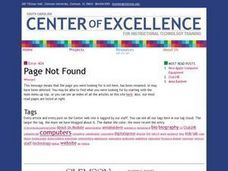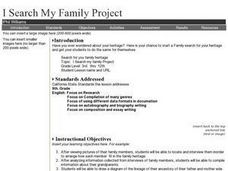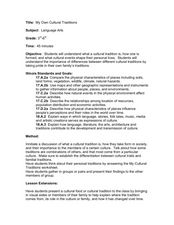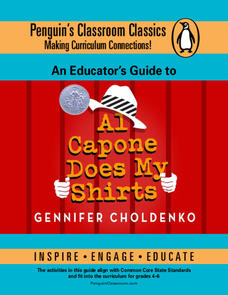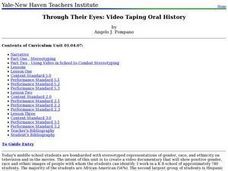Curated OER
Family History
Students discover their family history. In this genealogy instructional activity, students participate in a discussion about family history and why it is important. Students create a family tree and present the family tree to the class....
Curated OER
My Family: Past, Present,
Second graders explore the lives of actual people who make a difference in their everyday lives. They differentiate between events that happened long ago and events that happened yesterday by studying their family histories. The unit...
Curated OER
"History of My Family"
Students explore world geography by participating in a family history project. In this U.S.S.R. lesson, students read assigned text regarding the Stalinist era of Russia and the intolerance that thrived there. Students answer a list of...
Curated OER
"Me and My Family Tree"
Young scholars explore genealogy by reading a family history book in class. In this family tree lesson, students read the story Me and My Family Tree by Joan Sweeney and discuss their own family history. Young scholars identify what the...
Curated OER
A Family Celebration
In this family history activity, students interview a family member about places where they lived and then write 4 short answer questions based on the responses.
Curated OER
Reading Questions: Alex Haley's "My Furthest Back Person: The African"
Based on Alex Haley's moving essay "My Furthest Back Person: The African," these 11 questions support comprehension and prepare readers for discussion of the text. Use this tool, and the essay, as a nonfiction addition to units on...
Curated OER
My Arkansas Family Tree
Here is a two-part instructional activity that introduces learners to genealogy by having them create family trees, and map the movements of their ancestors. While this resource is designed for kids who live in Arkansas, it certainly can...
Curated OER
Family Tree Community Project
Fifth graders answer questions such as: Where does my family come from? What was it like for my ancestors to grow up as America developed? What differences in society were present then? What was similar to today? students conduct...
Curated OER
Family Traditions, Customs and Beliefs
Students discuss African childhood, explore family traditions, customs, and beliefs, examine African recipes, discuss differences or similarities in food preparation between the U.S. and Africa, and prepare a dish with adult supervision.
Curated OER
My Family Tree
Students create a family tree. In this ancestry lesson, students research a country that one of their ancestors is from. Students interview a grandparent and map out a family tree.
Curated OER
My Family Tree - Worksheet
Here is a family tree worksheet with space for writing: Me, Sister, Brother, Mother, Father, Aunt, Uncle, Mother's Mother, Father's Mother, Mother's Father, Father's Father. This would be useful as a homework assignment designed to...
Curated OER
Lesson Plan on Family History and Past Generations
Second graders listen to The Keeping Quilt and through class/small group discussion relate this story to beliefs, customs, and traditions of their own families. They make a class quilt based on these discussions.
Curated OER
My Family Worksheet
In this my family activity, students draw a picture of the people in their family and write a few sentences about their family.
Curated OER
I Search My Family Project
Students research their family's heritage. They follow a guide, document their family's history and put it together in report form.
Curated OER
Discovering My Family History
Students research their family trees. They research Internet sites, conduct interviews and, when possible, access primary sources to compile information about their family's history. Students present their findings in a family tree.
Curated OER
Quilting Our Diverse Classroom
Students explore diversity and race by creating art. In this ethnic background lesson plan, students discuss their family history, where their relatives lived and how it affects their life today. Students create pieces of a quilt...
Curated OER
My Family
In this family tree worksheet, students fill in the blanks about the relations of the family and their occupations and answer true and false questions. Students complete 22 questions about the family tree.
Curated OER
My Own Cultural Traditions
Students complete a worksheet on personal traditions. In this cultural traditions lesson, students discuss what a cultural tradition is and why they are important to the members of the culture. Students distinguish between cultural...
National WWII Museum
“My Dear Little Boys…” Interpreting a letter home from the war
Letters have long been prized by historians as primary sources for what they reveal not only about events but also about the emotional responses of the writers to these events. "My Dear Little Boys," a letter written by Leonard Isacks on...
Annenberg Foundation
Becoming Visible
The television and interstate highways both came of age in 1950s America. Scholars use film, text, and discussion to explore how these and other cultural icons shaped the literature of the time. Pupils also create a family history...
Penguin Books
An Educator's Guide to Al Capone Does My Shirts
It's hard to imagine that life on Alcatraz could be dull. A series of intriguing lessons take readers through the novel Al Capone Does my Shirts. Pre-reading questions introduce the text and a range of suggestions, from comic strips to...
Curated OER
Who's Who In My Family (Book Share)
Students read Who's Who In My Family, relate the story to their own family relatives, traditions and heritage and compare with classmates. They make their own family trees and form a live action family tree.
Curated OER
Creating Identity Posters
Students discover the identities of their classmates. In this tolerance lesson, students create individual posters showcasing their identity, history, and family background. Students examine the posters to get a better...
Curated OER
Through Their Eyes: Video Taping Oral History
Students identify the stereotypes they are faced with on a daily basis. In groups, they use this information to identify the ways stereotypes are portrayed in movies and television. They use a video camera to record oral histories of...









